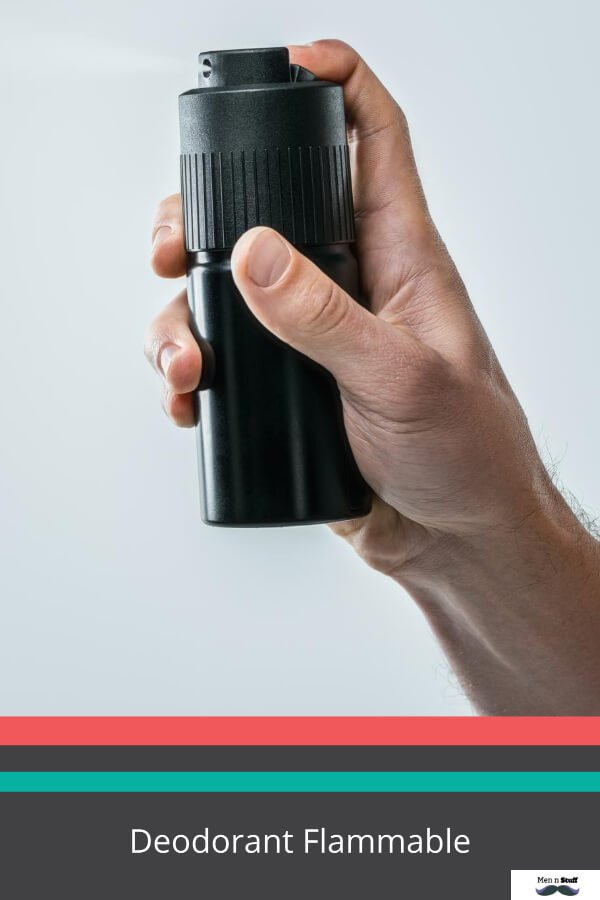Yes, deodorant is flammable. It contains propellants, such as butane and propane, which are highly flammable gases. These propellants are used to propel the deodorant out of the can and onto the body.

Is Deodorant Flammable?
Underlining the categorical significance of this query, this listicle expands on whether deodorants are flammable.
- Composition of Deodorants: Primarily, deodorants are composed of alcohol or aluminum salts, fragrance, and aerosol propellants. It’s the presence of these aerosol propellants ( mostly butane, propane, or isobutane) that makes the deodorant flammable.
- Flammability Factor: On account of their composition, in close proximity to an ignition source, deodorants can indeed be flammable. If the deodorant is a spray and exposed to open flame or high heat, it can certainly catch fire.
- Label Indications: Most manufacturers include warning labels on the packaging that indicate potential flammability. Users are often advised against using these near open flames, storing them at high temperatures, or disposing of them in the fire.
- In the Case of Roll-ons and Sticks: It’s important to note here that while spray deodorants are flammable due to their aerosol propellants, roll-on and stick deodorants mainly comprise water, antiperspirants, and scent, making them considerably less flammable.
- Incidents and Accidents: Over the years, numerous incidents involving the flammability of aerosol deodorants have been reported. Cases of automobile fires due to high heat storage or fire mishaps from incorrect usage underline this fact.
- Safety Practices: For users’ safety, it’s recommended to always follow product usage guidelines. Store these products in a cool place, away from sources of ignition, and use them in well-ventilated areas.
Deodorants, in their aerosol form, are indeed flammable, mostly due to their propellant content. Stick and roll-on variations, contrastingly, demonstrate considerably low flammability. It’s always crucial to adhere to safety practices while using these products to avoid unfortunate accidents.
How Do Chemicals Play An Important Role In Making Them Flammable?
The logo on the deodorants may also increase the curiosity about the volatile nature of the deodorants. Some even try spraying it into the fire to look for the results. Deodorants, in general, are made of a specific composition of alcohol in it.
It is the reason for the occurrence of the fire when it is in contact with flammable objects. Deodorants also contain other volatile chemicals like Propane, Butane, Isobutane, and other chemical components. The composition of these chemical components is combustible.
So it is advisable to keep the container under 50 degrees Celsius and avoid direct contact with sunlight, which could emit fire. It is primarily recommended to follow the pack’s precautions and keep it away from children because these inflammatory liquids could cause irritation and severe damage to sensitive skin.
Components Of A Deodorant
| Useful Ingredients | Harmful Ingredients |
| Zinc oxide | Aluminum |
| Titanium dioxide | Triclosan |
| Clay | Parfum |
| Charcoal | Paraben |
| Baking soda | Propylene glycol |
| Apple cider vinegar | Phthalates |
| Essential oils | Artificial fragrance |
Deodorant Ingredients To Seek
Always choose an effective deodorant with harsh ingredients for your body odor and one which is somewhat smooth on your skin. The ingredients mentioned below are soft on the skin and good to get rid of stinking smells from your body. They create a healthy microbiome in the applied area and prevent foul odor.
1. Zinc Oxide
The prominent active ingredient is Zinc Oxide, which can beat the foul body odor and make you feel fresh forever. In general, the zinc oxide can kill all sorts of bacterial infections like Corynebacterium spp. and Staphylococcus spp, which are the main reasons for the body’s foul odor. Zinc oxide helps you to get rid of it.
2. Titanium Dioxide
The most important and influential ingredient is Titanium Dioxide, which possesses lots of antibacterial properties. Thus, it exclusively kills the odor emitting bacteria and restricts the foul smell of sweat. These bad odors could create lung inflation, which leads to other health complications. Titanium dioxide acts as a sunscreen, it acts lighter on the skin and bold on the infections.
3. Clay
Clay is another exceptional ingredient in deodorants. If your traditional deodorants cause redness and an itchy reaction on the skin, don’t become anxious. It is the nature of the clay, which will be soothing for the compromised armpit. It absorbs oil, moisture, sweat, and dirt from the layer of the skin. It is an efficient and effective ingredient, especially during summer days.
4. Charcoal
The functions of charcoal and clay are almost similar, which have resembling characteristics. It also absorbs the sweat, dirt, and oil from the skin. The charcoal in the deodorants will clear the entire layer and prevent it from discoloring.
5. Baking Soda
Sodium Bicarbonate or Baking soda is the critical component used to kill odor-emitting bacterial infections. It also absorbs sweat, wetness, and moisture and helps you feel the core’s freshness. It is an essential ingredient in native deodorants, ensuring ultimate freshness with soothing skin free from bacterial infections.
6. Apple Cider Vinegar
Next to other vital ingredients, Apple cider vinegar is the most crucial ingredient, which has the incredible ability to act harshly upon bacterial infections. Its acidic pH enhances the growth of good bacteria, which is good for the skin layer. The good bacteria kills the harmful bacteria and soothes the skin preventing the occurrences of foul odor.
7. Essential Oils
The essential oils in the deodorants add fragrance to the solution in the deodorants. Instead of adding artificial perfumes and fragrances, the essential oils smooth the skin and act as nutrients to the skin layer. It eliminates the body’s foul odor; essential oils are taken from Peppermint, Tea tree, Lavender, sweet rose, fresh juniper, vanilla, and other natural source ingredients. It controls the growth of bacterial infections and prevents foul odors. The deodorants need to possess essential oils to ensure healthy fresh skin.
Deodorant Ingredients To Avoid
The harmful ingredients heavy on the skin layer should be avoided to have irritation-free skin. With the emergence of natural deodorants, these ingredients are largely neglected by the users. The common elements to be avoided are as follows,
1. Aluminum
The influence of aluminum in deodorants could cause chronic disease. It could cause several complications and impact the person’s health to the core. Usually, before shaving, applying the antiperspirant with aluminum could cause various infections in the skin layer. The abrasions and nicks on the skin enable the chemical to penetrate the skin where the aluminum infiltrates lymph nodes and can cause cancer. When a person applies deodorants with aluminum then they are prone to get affected by breast cancer, which could cost the person’s life a great threat.
2. Triclosan
The next ingredient to be avoided is Triclosan, which is harsh on the skin. In 2016, the FDA declared to ban Triclosan from adding it in products like deodorants, soaps, hand sanitizers, etc. It is considered to be an unsafe ingredient in nature.
As per the FDA, Triclosan is a pesticide that can cause various skin irritations and complications. Triclosan is termed as an endocrine disruptor by a crew of 200 scientists. Thus, it is toxic to the skin and the environment as well.
3. Parfum
Parfum can denote a meaning of fragrance, but as far as deodorants are concerned, another chemical scent irritates the skin to the core. If you are not feeling the irritation initially, you will develop complications later as the ingredient’s nature could cause problems to the skin.
4. Parabens
The effective preservative restricts the growth of microorganisms and eliminates the foul odor from the body. Parabens, despite their natural abilities, create various complications and skin irritations. It mimics the estrogen in the body, and there is a lot of risk for the person to be affected by breast cancer. Overall, 99% of the breast cancer samples contain parabens in it.
5. Propylene Glycol
Propylene glycol causes itchiness and irritation on the skin. As per Healthline, propylene glycol could cause redness on the skin, allergic to the skin. It is not eco-friendly as well.
FAQs
1. Will Applying Deodorants Cause Skin Allergy?
2. Is It Right To Apply Deodorants Routinely?
3. How Far Deodorants Impact Human Health?
References:
https://eartheclipse.com/science/misc/is-deodorant-flammable.html
https://firefighterinsider.com/deodorant-flammable/

